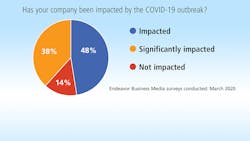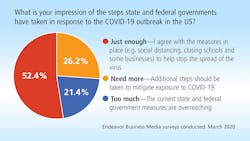COVID-19 Survey: 9 in 10 CV businesses already impacted
"We’re all in this together.”
The words are a rallying cry for people across the country, and around the world, who are hoping to inspire relief and recovery efforts amid the ongoing COVID-19 pandemic, which has killed thousands and brought entire nations to a standstill.
They’re also an all-too-accurate reflection of just how universal is the virus’ devastating impact.
Unemployment is soaring to record levels and small businesses are struggling as people stay home to stop the spread of the disease, leaving the United States economy in dire straits, and no industry is immune, including trucking, which is attempting to carry on while dealing with adverse impacts to every sector, from OEM suppliers and manufacturers, to dealers, carriers and service providers—who all are suffering together.
In a survey of fleets, manufacturers and associated businesses covered by Endeavor Business Media’s commercial vehicle group, which includes FleetOwner, Trailer/Body Builders, Bulk Transporter and Refrigerated Transporter magazines, nearly 90% of respondents indicated their business has been affected by the COVID-19 outbreak.
Those responses came from business across the CV group’s readership, including dry and liquid bulk transporters, reefer carriers, and trailer and truck body manufacturers, and their concerns are mirrored in larger economic surveys, like a new weekly survey of small and medium-sized businesses conducted by the United Parcel Service (UPS).
UPS sent its first survey to 1,200 people between March 24 and March 30, and 77% of US-based respondents reported either a negative or significantly negative impact. Nearly 70% expected to report a revenue decline for the first quarter of 2020.
FTR Intel and ACT Research both reported plummeting US trailer orders in February, with both saying orders were down 45% year-over-year—and that was before the virus strengthened its grip on the US economy in March—and ACT said in its latest North American Commercial Vehicle OUTLOOK that the continued spread of COVID-19 into April has resulted in freefalling GDP assumptions, and by extension freight volumes, carrier profits and expectations for commercial vehicle demand.
And Dan Furth, president of National Tank Truck Carriers, whose membership includes fuel and chemical haulers and tank trailer manufacturers, painted a bleak picture of COVID-19’s impact on trucking in his recent comments to Bulk Transporter. “There’s no way to sugar coat this thing—it’s tough out there,” Furth said. “And many, if not all, of our carriers are experiencing revenue declines and uncertainty more than they ever have. This is economic uncertainty times 10. You’re going to see capital expenditures reduced to virtually nothing.”
“It’s been a rollercoaster,” confirmed Jim Franck, president of National Carriers, which runs a fleet of 1,200 refrigerated trailers. “Just look at the stock market. It’s up 1,000 (points), down 500, up 2,000, down 3,000—it’s just crazy.
“And that’s the way that everything has been going.”
Franck said his business boomed in the first couple of weeks of “panic buying,” as people flocked to stores and adjusted to the Centers for Disease Control’s social-distancing guidelines, then ground to a halt equally as quickly, as overstocked and undermanned warehouses and distribution centers struggled to offload goods.
Now it’s a daily grind to find enough work to keep employees busy, and Franck isn’t alone in that stressful endeavor. Survey respondents indicated numerous threats to their businesses, from access to cargoes, or a lack thereof, on the fleet side, and supply chain disruptions in manufacturing, to dwindling customer bases for services, and more than a third said their business had been “significantly” adversely impacted by the outbreak.
A quarter of respondents said they were forced to temporarily close select facilities.
“The most challenging part is dealing with the anxiety everybody is suffering from right now, and trying to keep everybody pumped up and positive,” Franck said.
Another key concern raised here, and by the Commercial Vehicle Training Association (CVTA), is an inability to get new truck drivers trained, licensed and deployed due to the widespread closures of state driver licensing agencies, threatening the industry’s ability to ensure the country’s supply chains keep moving.
As of April 7, 27 states had closed their driver licensing agencies, and the remaining 23 were operating on a limited basis, CVTA said. But with the trucking industry accounting for moving 71% of all freight across the country, the supply chain depends on a steady stream of new commercial drivers entering the workforce.
“It’s imperative that individual states recognize the national impact of their decisions to shut down CDL training schools and SDLAs. We need them to specifically recognize that CDL training schools and SDLAs are essential services,” said Don Lefeve, CVTA president. “Equally important is appealing to Congress to give the Secretary of Transportation the temporary authority to create a pathway for the supply chain to continue. This starts with commercial driver training and licensing.”
As challenging as the situation is for everyone, people are rising to the occasion.
Jonathan Brooks, CEO of American Trailer Rental Group (ATRG), said his company is in good shape thanks to diversified business and hard-working employees, with only minimal cuts to travel and non-essential expenses through the first month. “We are very blessed to have a broad customer base and minimal health issues among our team members, and the team members who can are working from home very efficiently.”
For ATRG, the greatest challenge is adjusting to the “new normal,” as company leaders attempt to keep team members safe from the virus.
“In our largest shop, we went to a second shift to allow more social distancing at work, and all employees that can are working from home,” Brooks said. “We are cleaning our facilities with increased scrutiny. As for our team members, we are erring on the side of caution when employees experience any sort of cold, sinus or flu conditions, until they are more certain of what they are dealing with. But none of these have been overly difficult to implement thanks to our team members and general managers working together to keep everyone healthy.”
More than 90% of respondents said their company made changes to deal with the virus, with the majority pointing to increased measures taken to ensure business locations and equipment, including trucks and trailers, were thoroughly cleaned and sanitized; and transitioning at least some employees to working remotely.
Despite the logistical constraints presented by social distancing, 52.4% of respondents said the responses of state and federal governments to the coronavirus outbreak in the US were “just enough,” indicating they agreed with most measures in place, including closing schools and businesses, and cancelling large events. 26.2% said the collective response was insufficient, and additional steps should be taken, and only 21.4% said it was “too much,” or overreaching.
Franck lamented the conflicting messages from different media, and the injection of partisan politics in a global pandemic, but said he’s satisfied with the overall response to an unprecedented situation that had no playbook.
“Government hasn’t been perfect, but I think it’s done a good job,” he said. “Communication’s been outstanding, not only at the federal level but at the state level. People are really trying to put a positive spin on it, but then the politics come into play, which is inevitable in today’s environment, and it throws everything out the window.”
Brooks acknowledged that, while his business has fared well thus far, many ATRG customers—outside of those delivering essential goods and services—have seen business slow substantially, along with the larger economy. The UPS survey found the pandemic had closed or curtailed operations at nearly half of all businesses—and that was halfway through the first month of a quarantine that showed no clear signs of ending.
“There is a tremendous amount of uncertainty, but everyone is ready to get back to work,” Brooks said.
Franck said the key to a rapid recovery for his business—once parts of the economy finally start to reopen—is maintaining National Carriers’ driver base. Likewise, manufacturers need to hold onto their skilled workers, but many have been forced to furlough employees and cut pay, including for company executives.
“When this thing turns, it’s going to turn in a hurry,” Franck maintained.
The problem is, no one, including our leaders and “experts” knows when that will happen, making speculating about an eventual recovery—and a return to “true normal”—a difficult proposition. Fortunately for everyone in trucking, including those of us who cover every aspect of the industry, we’re all in this together.
“The longer it lasts, the harder the recovery’s going to be,” Franck said. “If this thing is over end of May, even into June, I think the recovery will be pretty quick. If we go through the summer, that’s out the window.”
About the Author
Jason McDaniel
Jason McDaniel, based in the Houston TX area, has nearly 20 years of experience as a journalist. He spent 15 writing and editing for daily newspapers, including the Houston Chronicle, and began covering the commercial vehicle industry in 2018. He was named editor of Bulk Transporter and Refrigerated Transporter magazines in July 2020.


